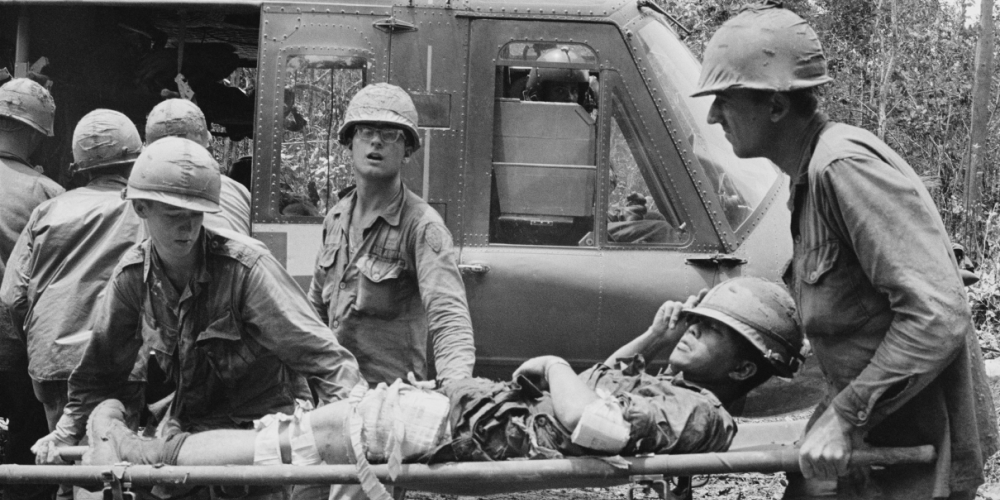Updated Sept. 27 with Dustoff Crews of the Vietnam War Congressional Gold Medal Act signed into law. Updated Oct. 2 with information about receiving updates on the medal process and ceremony.
For nearly a decade, MOAA members Lt. Col. Chris Siedor, USA (Ret), and Lt. Col. Steve Vermillion, USA (Ret), have been working to rally lawmakers to recognize Vietnam War aeromedical evacuation units and medevac crews — commonly known by their radio call sign “Dustoff” — with a Congressional Gold Medal.
Their efforts and those of other supporters paid off: Congress passed the Dustoff Crews of the Vietnam War Congressional Gold Medal Act on Sept. 17; President Joe Biden signed the bill into law Sept. 26.
It will collectively award the more than 3,000 pilots, medics, and crew who flew between combat zones and field hospitals during the war with the Congressional Gold Medal, the highest award Congress can bestow.
“The passage of this legislation marks a milestone in recognizing U.S. Army helicopter aeromedical aircrafts of the Vietnam War,” said Vermillion, president of the Vietnam Dustoff Association. “These unsung aircraft risked their lives on a daily basis to save the lives of others.”

A U.S. Army helicopter collects wounded servicemembers in Vietnam in August 1966. (Photo by Bill Hall/Michael Ochs Archives via Getty Images)
Vermillion arrived in Vietnam as a warrant officer 1 on Jan. 5, 1969, and was assigned to 45th Medical Company Air Ambulance (Dustoff). He left Vietnam in early 1970 as a chief warrant officer 2, having flown 1,145 combat hours and picking up 2,217 casualties.
The medal effort has been underway since 2015, spearheaded then by Medal of Honor recipient Maj. Gen. Pat Brady, USA (Ret), a fellow Vietnam Dustoff pilot. Sen. John Cornyn (R-Texas) introduced legislation to secure the medal that year, but the bill never moved out of committee. In subsequent years, the bill was reintroduced but did not make progress.
Over the past nine years, Siedor — a Dustoff pilot who evacuated 719 casualties and flew 530 combat hours during his year in Vietnam assigned to the 57th Medical Detachment — has sent over 2,600 emails to members of Congress and visited lawmakers on Capitol Hill nearly a dozen times to urge them to support the bill.
[VIETNAM UNCHRONICLED: The Push to Recognize Dustoff Crews]
In an interview with MOAA in 2021, he cited statistics that he said made Dustoff crews deserving of the medal.
“Dustoff and medevac crews flew more than 496,000 missions from 1962-73,” Siedor said. “Ninety pilots were killed and nearly 380 were wounded, and 121 crew members were killed and 545 wounded. They flew 24/7 and did not have the luxury of waiting for a cleared landing zone, the weather to clear, or night to end, as urgent patients faced death without immediate lifesaving care.”

Lt. Col. Chris Siedor, USA (Ret), flew 530 combat hours as a Dustoff pilot in Vietnam. Here, he sits in the cockpit in Long Binh, Vietnam, in April 1971. (Photo courtesy of Chris Siedor)
Siedor and Vermillion both credit the involvement of the Hunton Andrews Kurth LLP firm with moving the needle on the bill.
“Had it not been for the Hunton group stepping up in an exceptional way, under the direction of law partner Fred Eames, in concert with Garrett Kral, Todd Mikilop, and countless other members of group, this Congressional Gold Medal would still be waiting to be approved,” Siedor said.
The group provided more than 1,550 pro bono lobbying hours to the effort, said Vermillion, including organizing visits of Dustoff members to Capitol Hill to meet with lawmakers.
“By June, the wave [of bill co-sponsors] was coming,” said Siedor.
The Senate passed the bill in May. It cleared the House about four months later.
[VIETNAM UNCHRONICLED: POWs Return to Hanoi]
In a press release announcing the bill’s passage, Rep. Cathy McMorris Rodgers (R-Wash.), who co-sponsored the legislation with Rep. Derek Kilmer (D-Wash.), emphasized the sacrifice of Dustoff crews.
“During the Vietnam War, millions of Americans left home to fight in muddy trenches and jungles halfway around the world. Many made the ultimate sacrifice. Others returned home just to be ostracized and ridiculed. Some were never recognized for their service at all,” Rodgers said. “Unfortunately, that’s exactly what happened to the Dustoff crewmembers who risked their lives to save nearly 1 million others. They were some of the very best, and their heroism deserves to be recognized.”
Kilmer called the award “an important step toward recognizing the pivotal role that these servicemembers played in saving lives and serving their country proudly. I’ll keep pushing to ensure we demonstrate our appreciation to our veterans on behalf of a grateful nation.”
[WATCH: To Save a Soldier (1966), Part One | Part Two]
For Siedor, the passage of the bill is bittersweet.
“When I started this, I tried to get handle of how many of us were still alive,” he said. “We estimated about 2,400 at that time. Today, that number is probably about 1,800. It makes me crazy that it took so long.”
However, he said he’s glad the Dustoff crews will finally get this long-deserved recognition.
“This Congressional Gold Medal honors the exceptional intrepidity and dedication of Army medical evacuation crews in the Vietnam War who flew under the call signs of Dustoff and medevac,” Siedor said. “During the 10-plus years of picking up some 900,000 patients, the standards for medical evacuation were forever established.”
Vermillion expressed his gratitude for the award. “Our veterans are truly humble and thankful,” he said.
The Vietnam Dustoff Association is building a database of names and email addresses to keep concerned parties up to date about the Congressional Gold Medal process, including the status of the minting and production of the medal and details of the final ceremony. To have your information added to that database, email vietnamdustoffgcm@gmail.com.
Share Your Story
Do you have a personal story you want to share about the value of service in your life or why it should be important to all Americans? Please share so MOAA can help Congress and the uniformed services strengthen their relationship with the American people for a stronger all-volunteer force.

